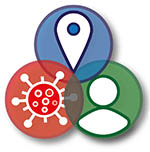
Understanding what influences the wearing of face coverings
The wearing of face coverings is considered to be important in preventing the transmission of airborne viruses, including the virus that causes COVID-19.
The aim of the present research is to understand what influences the wearing of face coverings. Only by understanding what influences the wearing of face coverings can we begin to develop interventions to promote uptake, reuptake (if necessary) and sustained use of face coverings.
Our research questions are:
- What is the prevalence of face covering use in work, public transport and indoor leisure settings?
- How has the prevalence of face covering use in work, public transport and indoor leisure settings changed over time?
- What factors determine face covering use?
The third research question is particularly important because understanding what are the drivers of face covering use will provide the building blocks with which to develop interventions to promote uptake, reuptake (if necessary) and sustained use of face coverings.
We are addressing these questions using a 4-wave survey among a representative sample of the UK population. Our analysis of wave 1 showed that deficits in people’s automatic motivation (e.g., habits, emotional reactions) is key to understanding people’s wearing of face coverings.
At wave 3, we have therefore deployed an intervention that we know addresses people’s automatic motivation. Specifically, we are asking a random sample of people to form if-then plans. We have previously shown that when people form if-then plans, they are more aware of critical situations (“ifs”) and that their responses (“thens”) to those critical situations are speeded up. Crucially, we have shown that if-then plans change automatic motivation and actual behaviour in everything from helping people be more physically active to reducing levels of self-harm.
We therefore have a fourth research question:
- People who form if-then plans will be more likely to wear face coverings than people who do not.
Project Team
- Chris Armitage, University of Manchester
- Anna Coleman, University of Manchester
- Professor David Fishwick, HSE
- Nicola Gartland, University of Manchester
- Sheena Johnson, University of Manchester
- Chris Keyworth, University of Leeds
- Martie Van Tongeren, University of Manchester
